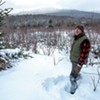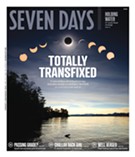Published June 25, 2003 at 5:25 p.m.
Arnie Gundersen knows a thing or two about failure. In fact, he's an expert on it. Gundersen is a licensed nuclear reactor operator. For 20 years he worked in the atomic energy industry assessing the safety and reliability of nuclear reactors, measuring the wear and tear on components and calculating their risk of failure. These days, when he's not teaching math and physics at Burlington High School, Gundersen testifies as an expert witness on nuke-related issues, about 40 percent of the time on behalf of the nuclear industry. Suffice it to say, he is hardly a knee-jerk opponent of nuclear power.
But when Gundersen learned recently that the Vermont Yankee Nuclear Power Station in Vernon was seeking permission to increase its power output by one-fifth over the next two years, the idea didn't sit well with him. So he took his concerns to the Vermont Public Service Board (PSB), which held hearings last week to consider the 20-percent power "uprate" request. If the PSB and the Nuclear Regulatory Commission (NRC) approve the plan, Vermont Yankee will become the oldest nuclear power plant in the country to attempt a power increase of that magnitude.
Entergy, the Mississippi-based company that bought Vermont Yankee last summer, says the power uprate is needed to ensure New England has a stable, reliable and affordable source of energy for the next decade. It says the power increase would provide an additional 110 megawatts of electricity to the region as well as about $400,000 in new taxes to Vermont. Entergy says it is ready to make a significant investment in the power plant in order to generate the additional power and ensure the plant's continued safety and reliability.
Gundersen argues, however, that those benefits come at too steep a price. He contends that pushing a 31-year-old nuclear plant to produce 20 percent more power endangers not only residents living near the plant, but in all of Vermont and parts of New Hampshire, New York and Massachusetts. Gundersen believes a power increase on that scale makes the odds of an unforeseen and potentially "catastrophic failure" about 10 times more likely. What does he mean by catastrophic? "Not as severe as Chernobyl," Gunder-sen says, "but beyond Three-Mile Island."
Vermont Yankee, which began generating electricity in 1972, is one of the oldest nuclear power plants in the country. Four other New England plants of the same vintage -- Yankee Rowe, Connecticut Yankee, Maine Yankee and Millstone I -- have already been shut down due to age-related problems. As Gundersen puts it, "Vermont Yankee was being designed when Kennedy was in office and opened when Lawrence Welk was still on TV."
It's rare for nuclear plants to attempt a power increase this large, according to Bill Sherman, who oversees Vermont Yankee on behalf of the Vermont Department of Public Service. Of the more than 82 plants in the United States that have sought power uprates in the last 20 years, only 10 have increased their power by 13 percent or more. And only three have been granted a 20-percent increase. The one plant now operating at 120 percent of its original power -- Clinton Nuclear in Illinois -- was built in 1987.
Why is Gundersen concerned? In order for Vermont Yankee to generate 20 percent more power, he explains, plant operators plan to increase the pressure of water and steam flowing through the plant's pipes, pumps and turbines. Since those parts are already more than 30 years into their 40-year expected life, turning up the pressure will only put them under additional stress and fatigue, hastening their erosion and reducing their life span. "You're not talking about a garden hose," says Gundersen. "Problems become real big real fast if you're not careful."
As a cautionary tale, Gundersen points to a similar power uprate attempted last year at the Quad Cities nuclear reactor in Illinois. Shortly after that plant upped its power output by 18 percent, a 10-foot chunk of steel broke loose inside a steam dryer and went hurtling through the pipes, causing an 11-day shutdown. Coincidentally, right after Gundersen testified to the PSB about the Quad City mishap, he learned that a second, more serious accident had occurred there just two days earlier. He cites these as just two examples of the unforeseen problems that can arise when you push old nuclear reactors beyond their original design specifications.
"It's not like you can anticipate the problems that occur when you push 20 percent more power through it," says Gundersen. "Sooner or later you're going to miss something. The margins for error keep disappearing and disappearing until there are no margins."
Nor is Gundersen reassured by Entergy's plans for plant modifications and equipment upgrades. As he points out, new components are inherently less reliable than somewhat older parts as they go through a "break-in" period, and therefore are more prone to failure. Moreover, because few plants as old as Vermont Yankee have attempted a 20 percent power increase, Entergy's risk assessment is inherently flawed, Gundersen contends. "It is like trying to determine how much longer an 80-year-old will live by using demographic data from a group of 20-year-olds."
Finally, he says, a 20-percent increase in power not only produces 20 percent more radioactive waste -- which creates additional waste-storage problems -- but should a radiation leak occur, its impact can expand exponentially. "When you're dealing with an accident from 20 percent more power, we're not talking about a Brattleboro problem anymore," Gundersen says. "We're talking about a Burlington problem."
"I'm not getting paid for my testimony. I'm just a down-winder," adds the Burlington resident, who doesn't challenge Vermont Yankee's right to operate at its current power until its license expires in 2012. "I don't usually stick my neck out, but I wanted to talk."
Actually, Gundersen has stuck his neck out before -- and nearly lost his head. When he left the nuclear industry, Gundersen was senior vice president of Nuclear Energy Services (NES), a major supplier of goods and services to nuclear plants, including Vermont Yankee. But his professional career, financial well-being and family life were thrown into turmoil in April 1990 when he discovered some low-level radioactive material stored in an accounting safe at NES headquarters in Danbury, Connecticut. Shortly after he blew the whistle to federal regulators at the NRC, he was fired from his $120,000-a-year job, "blacklisted" by the nuclear industry and harassed and ostracized by his former co-workers for years.
But Gundersen refused to keep quiet about ongoing safety problems. As a result, his former employer slapped him with a $1.5 million defamation suit. The case was finally settled out of court six years later, but not before Gundersen and his family had gone through a bankruptcy proceeding, foreclosure on their house and other personal hardships.
Following Gundersen's appearance in Montpelier last Thursday before the PSB, Vermont Yankee spokesman Rob Williams said he had not read Gundersen's written testimony and thus could not comment on his allegations. He did say, however, that waste storage will not be a problem and Vermont Yankee's planned upgrades and modifications will be more than sufficient to ensure the plant's safety and reliability for years to come. "We've kept this plant up-to-date," says Williams. "An indication of that is how many utilities were bidding on the plant when it was in the process of being sold."
Nevertheless, Entergy's attorneys at the PSB hearing asked few questions that challenged Gundersen's credentials or contested his seven-page written comments, including his conclusion that "the likelihood to experience a catastrophic failure... appears to be unacceptably high." As one observer in the room commented later, "It looks like they wanted him off the stand as quickly as possible."
More By This Author
Speaking of...
-

Stamford Wind Proposal Tests Whether Large Turbines Have a Future in Vermont
Nov 22, 2023 -

Vermonters Look for Cheaper Ways to Keep Their Homes Warm This Winter
Nov 9, 2022 -

GlobalFoundries Asks to Leave Green Mountain Power to Form Its Own Utility
Apr 28, 2021 -

Grid Block: Vermont’s Aging Transmission Network Can’t Keep Pace With Green Power Projects
Mar 17, 2021 -

Solar Flares: Call to Double Vermont's Renewable Energy Capacity Ignites Debate
Mar 10, 2020 - More »
Comments
Comments are closed.
From 2014-2020, Seven Days allowed readers to comment on all stories posted on our website. While we've appreciated the suggestions and insights, right now Seven Days is prioritizing our core mission — producing high-quality, responsible local journalism — over moderating online debates between readers.
To criticize, correct or praise our reporting, please send us a letter to the editor or send us a tip. We’ll check it out and report the results.
Online comments may return when we have better tech tools for managing them. Thanks for reading.












































